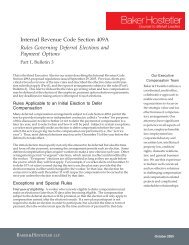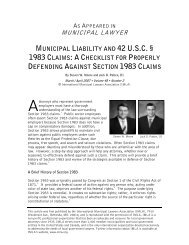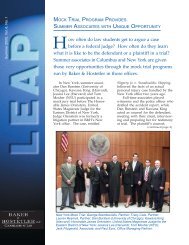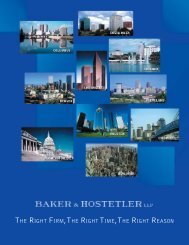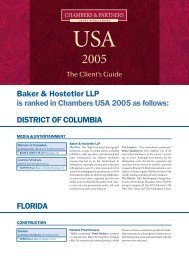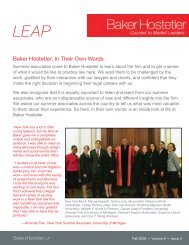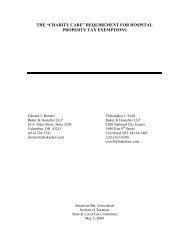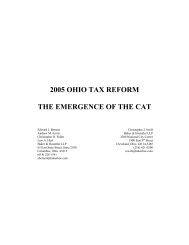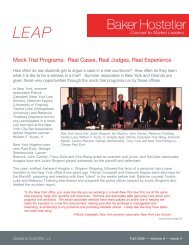Prejudgment Remedies in Texas - Doug D'Arche - Back to Main Page
Prejudgment Remedies in Texas - Doug D'Arche - Back to Main Page
Prejudgment Remedies in Texas - Doug D'Arche - Back to Main Page
- No tags were found...
You also want an ePaper? Increase the reach of your titles
YUMPU automatically turns print PDFs into web optimized ePapers that Google loves.
11. Deb<strong>to</strong>r's Response <strong>to</strong> Writ of Garnishmenta. In GeneralA Deb<strong>to</strong>r that has received notice of a Garnishment may respond <strong>in</strong> a number ofdifferent ways. The Deb<strong>to</strong>r may file a Motion <strong>to</strong> Dissolve the Writ of Garnishment, the Deb<strong>to</strong>rmay file a Motion <strong>to</strong> Modify the Bond Amount, the Deb<strong>to</strong>r may file a replevy bond, or the Deb<strong>to</strong>rmay simply chose <strong>to</strong> ignore the Writ of Garnishment and allow for the funds held by theGarnishee <strong>to</strong> be paid <strong>to</strong> the Credi<strong>to</strong>r.b. Dissolv<strong>in</strong>g or Modify<strong>in</strong>g the Writ of GarnishmentA Deb<strong>to</strong>r whose property or account has been garnished, or any <strong>in</strong>terven<strong>in</strong>g party whoclaims an <strong>in</strong>terest <strong>in</strong> such property or account may seek <strong>to</strong> vacate, dissolve or modify the Writ ofGarnishment, and the order direct<strong>in</strong>g its issuance, for any grounds or cause, extr<strong>in</strong>sic or<strong>in</strong>tr<strong>in</strong>sic. Tex. R. Civ. P. 664a; GE Capital Corp. v. ICO, Inc., 230 S.W.3d 702, 705 (Tex. App.—Hous<strong>to</strong>n [14 th Dist.] 2007, pet. denied); Mitchell v. Credit Union, 2007 Tex. App. LEXIS 4346, *2-3 (Tex. App.—Dallas 2007, no pet.); Cadle Co., 2007 Tex. App. LEXIS 1952 at *6-7. TheMotion <strong>to</strong> Dissolve the Writ of Garnishment must be <strong>in</strong> writ<strong>in</strong>g, must be verified, and mustspecifically admit or deny each of the facts found by the Court <strong>in</strong> the order that authorized theissuance of the Writ of Garnishment. Id. Where the Deb<strong>to</strong>r is unable <strong>to</strong> admit or deny a f<strong>in</strong>d<strong>in</strong>g,the Deb<strong>to</strong>r shall set forth reasons why it cannot admit or deny that f<strong>in</strong>d<strong>in</strong>g. Id. The motion mustbe supported by affidavits based upon personal knowledge. Id. Once the motion has beenfiled, it stays any further action except for orders concern<strong>in</strong>g the care, preservation or sale ofany perishable property. Id.Unless the parties agree <strong>to</strong> an extension, the Court must conduct a hear<strong>in</strong>g on themotion <strong>to</strong> dissolve the writ with<strong>in</strong> 10 days after it is filed. Id. It may be heard on less than 3days’ notice. Id. The hear<strong>in</strong>g is a dist<strong>in</strong>ct proceed<strong>in</strong>g from the Writ of Garnishment proceed<strong>in</strong>gbetween the Garnishor and the Garnishee. Swiderski v. Vic<strong>to</strong>ria Bank & Trust Co, 706 S.W.2d676, 678 (Tex. App.—Corpus Christi 1986, writ ref'd n.r.e.). The issue <strong>to</strong> be determ<strong>in</strong>ed at thehear<strong>in</strong>g is whether the Credi<strong>to</strong>r can prove the grounds that were relied upon for the issuance ofthe Writ of Garnishment. Id. The Credi<strong>to</strong>r does not have <strong>to</strong> prove that the Garnishee is<strong>in</strong>debted <strong>to</strong> the Deb<strong>to</strong>r because this is not one of the grounds necessary for the issuance of aWrit of Garnishment. Id.; Thompson v. Harco Nat. Ins. Co., 997 S.W.2d 607, 624 (Tex. App.—Dallas 1998, writ denied). Because the Credi<strong>to</strong>r has the burden <strong>to</strong> prove the grounds reliedupon for the issuance of the Writ of Garnishment, any failure <strong>to</strong> carry that burden requires theTrial Court <strong>to</strong> dissolve the writ. Huie-Clark J.V. v. American States Ins. Co. of <strong>Texas</strong>, 629S.W.2d 109, 110-11 (Tex. App.—Dallas 1981, writ ref'd n.r.e.). The Credi<strong>to</strong>r is not required <strong>to</strong>prove that the Deb<strong>to</strong>r does not, <strong>in</strong> fact, possess non-exempt assets sufficient <strong>to</strong> satisfy the debt.Black Coral Investments v. Bank of the Southwest, 650 S.W.2d 135, 136 (Tex. App.—Hous<strong>to</strong>n[14 th Dist.] 1983, writ ref'd n.r.e.). The Credi<strong>to</strong>r’s burden is only <strong>to</strong> show a reasonable basis forsuch belief. Id.If the Deb<strong>to</strong>r contends that the property garnished exceeds the amount necessary <strong>to</strong>secure the debt, <strong>in</strong>terest for one year, and probable costs, then the Deb<strong>to</strong>r has the burden <strong>to</strong>prove the reasonable value of the property garnished. Tex. R. Civ. P. 664a. If the Deb<strong>to</strong>r asksthe Court <strong>to</strong> substitute property, the Deb<strong>to</strong>r has the burden <strong>to</strong> prove justification for thissubstitution. Id. If the Court orders the Writ of Garnishment <strong>to</strong> be dissolved, that order willterm<strong>in</strong>ate the proceed<strong>in</strong>gs and it is a f<strong>in</strong>al disposition of the subject matter of the proceed<strong>in</strong>g. A.Wolfson's, Inc. v. First State Bank of Corpus Christi, 752 S.W.2d 614, 616 (Tex. App.—CorpusChristi 1988, writ denied). This entitles the Garnishee <strong>to</strong> possession or return of the garnishedmoney or property. Id.<strong>Page</strong> 12 of 36



